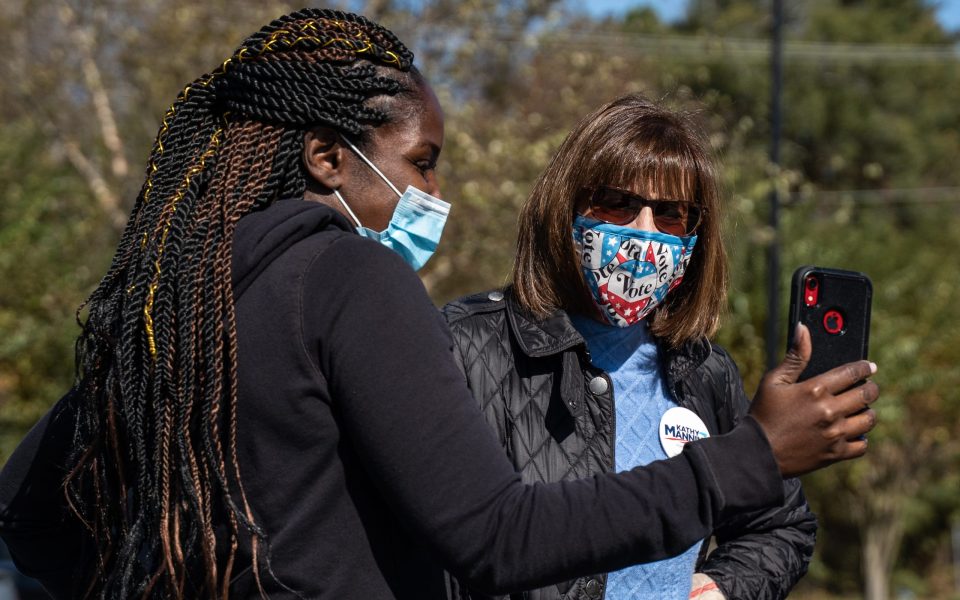In a record-high turnout, President Donald Trump was able to overcome an early lead by Joe Biden as late results came in, and is now leading Joe Biden by almost 100,000 votes and 1.41 percentage points. Sen. Thom Tillis is hanging onto his Senate seat by a similar margin. However, in North Carolina, absentee ballots can be counted up until 5 p.m. on Nov. 12 which could change the results. The Associated Press had not called the election in favor of either presidential candidate or the Senate race for North Carolina as of Wednesday morning.
Trump was losing both Triad counties by hefty spreads — Biden took more than 60 percent of the vote in Guilford, and won Forsyth by more than 10 points — on Tuesday evening. But heavy leads in the state’s urban counties seem to trail the red, rural wave as of Tuesday night’s results.
Steven Smith, 27, cast his vote for Trump at Brown Recreation Center in Greensboro after voting for him before in 2016. He said his main issue is the Second Amendment.
“I feel like once the Democrats get in, the guns laws are going to be changed drastically,” he said. “It’s just going to be too much, even coming close to repealing the Second Amendment might be possible, which is crazy to think about.”
As of midnight, Biden led in Electoral College votes 209 to 136, but Trump held leads in key battleground states of Florida, Michigan, Wisconsin and Pennsylvania. On Wednesday afternoon, Michigan was called for Biden.
Cal Cunningham, the Democratic challenger to Thom Tillis, is also trailing as of Wednesday morning. The contest followed much the same pattern as the presidential election, with Tillis coming in a bit behind Trump in total votes on Tuesday.
Tillis was losing Forsyth County by more than 10 points, and Guilford by almost 20. But again, margins in the rural counties were carrying Tillis by Tuesday evening. In the quest for a Senate majority, each party has flipped a seat as of midnight, leaving Democrats and Republicans with 46 seats each as of 1:25 a.m. with eight seats left in play.
Democrat Kathy Manning was able to secure the seat in the newly formed 6th Congressional District, which includes Greensboro, Winston-Salem and High Point. She defeated Republican Lee Haywood by 25 points. The district was drawn for a Democrat after court-ordered redistricting.
“Today, voters from across North Carolina’s Sixth Congressional District voted for change,” Manning said during her Zoom viewing party.” I’m honored to earn their confidence and their support. As our nation faces a convergence of several crises, families in the Sixth District are being left behind. In Congress, I will fight to help bring an end to the COVID-19 pandemic and to get resources to the families, small businesses, and local governments in need of support. I will also fight to address systemic racism in policing, housing, employment, and education.”
Other House races remain undecided, but thus far each party has flipped two seats and the count stands at 160 for the Democrats and 160 for Republicans; 115 seats are still in play tonight.
Turnout in North Carolina topped 74 percent, more than four points above than the high-water mark of 70 percent established in 2008, when Barack Obama won the state on his way to becoming president.
More than 4.5 million North Carolinians voted before Election Day through early and absentee voting, shattering all previous records. But the high early-voting numbers meant slower traffic at precincts on Election Day.
At the Tabernacle Baptist Church in High Point, Chief Judge Lisa Harris said she had seen 277 in-person voters by 3 p.m. “Most of our voters, over, 2,000, voted early,” she said. “Oh my goodness, I’ve been working here forever and it’s the highest I’ve ever seen.
Join the First Amendment Society, a membership that goes directly to funding TCB‘s newsroom.
We believe that reporting can save the world.
The TCB First Amendment Society recognizes the vital role of a free, unfettered press with a bundling of local experiences designed to build community, and unique engagements with our newsroom that will help you understand, and shape, local journalism’s critical role in uplifting the people in our cities.
All revenue goes directly into the newsroom as reporters’ salaries and freelance commissions.


Leave a Reply